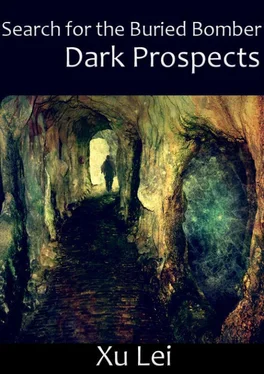The sand table gave an approximate idea of the size and shape of the underground river. It had become astonishingly wide. Around the river were the variously sized shapes of a command station, a bunker, a crane, and a small railway. All the underwater obstacles on the waywere distinctly marked. I could even see the area where Wang Sichuan said his way had been blocked by a pool of quicksand. The sand table showed that, using a great quantity of steel bars and concrete, the Japanese had built a foundational structure beneath the water and atop that erected a huge platform, supported on stilts. Beneath the platform was a filtration canal, allowing them to monitor the content of the underground river water. The most surprising structure on top of the platform was an elevated threerail track, with a long slope up into the void, like a three-tubed antiaircraft gun aimed at some target in the emptiness. Beneath the track was a triangular structure that resembled an upside-down high-voltage tower. The Shinzan was stopped at the end of the track, positioned at the very tip of the three rails—the very tip of the gun, in other words. Just over half its length rose above the dam. Chills ran down my spine. I had thought as much this whole time, but only now did I know for sure: the Japs had wanted to fly the goddamn Shinzan into the void!
By World War II, the Japanese already had considerable experience flying planes from aircraft carriers. Although I myself didn’t understand the mechanics of it, it was obvious they had believed it possible for the Shinzan to take off from here. As I thought of the Shinzan’s wreckage sunk beneath the water, my mind filled with questions. Given everything the Japanese did here, had the Shinzan ultimately taken off or not? And why had so many buffer bags been piled underwater? And where was that three-track railway?
A bolt of lightning flashed through my mind. I felt a chill spread from my neck all the way down to my heels. Remembering the shape of the plane’s wreckage, I distinctly recalled that the Shinzan’s front end had been facing away from the dam. Not only had it taken off, it had already flown back out of the abyss!

CHAPTER 41

Out of the Abyss
By no means am I familiar with the number of precise calculations required to get a heavy-duty bomber to take off within a cave, but if you’re talking about flying a bomber this massive back out of that abyss and then bringing it in for a landing—well, I think I can imagine some degree of the difficulty involved. You’d need to maneuver the plane in toward the mouth of the river, a challenging task in itself, but then, to complete the descent into such a small and narrow space—that’s just too much to ask. The length of the runway wouldn’t be a problem—towropes could be used to slow the plane down—the main issue is that the roof of the cave gives you no room for error. Mess up and you’re scrap metal. From the beginning the Japanese obviously hadn’t planned on a smooth landing. Those buffer bags had been in preparation for a crash, and that’s just what happened. To think of that fearful emptiness was terrifying. How daring those little devils had been! And I wondered, just what had the pilot seen down there?
Then, from behind me, came the sound of Wang Sichuan’s voice. I turned. He was walking toward me, his face covered with dirt and dust, dragging back our pale little animal man twisted into an extremely uncomfortable position. Wang Sichuan’s strength was immense. You weren’t breaking free once he seized you. The man had stopped resisting, and it looked like Wang Sichuan was dragging along a corpse.
I hurried over. Wang Sichuan pressed the man to the ground, swearing, “Goddamn, that wasn’t easy. It’s black as a crow’s feather out there, and this son of a bitch runs faster than a rabbit. He almost got away. Lucky my eyesight’s not bad.”
I shined my flashlight over the man’s face. I’d never seen him before. He was ghastly pale and soaked with sweat. Maybe it was from the chase, maybe he was always like this. He stared at me, his eyes bloodshot and his whole body quivering. His eyes stabbed at me with limitless hatred. Surprisingly, his uniform was different from Yuan Xile’s and the corpsmen’s we’d come across earlier. He was wearing a Lenin suit with a long jacket and a cloth belt. He didn’t look like a soldier. This sort of attire was more like what Li Siguang and the rest from the Chinese Academy of Sciences had worn in their day. Maybe he was some kind of expert. We searched his pockets and found an employee identification card. His name was Su Zhenhua, and sure enough, he was from the Ministry of Geology.
“Seems they were a lot more choosy with the first group,” said Wang Sichuan, an angry look on his face. “The standards were way higher.”
Once the Soviets had left, Yuan Xile was one of the most important of the so-called Russian ass-wipers. She was on the same level as Wang Ming or Bo Gu during the Land Reforms—real high. The Ministry of Geology wasn’t just about geology. Some people had their positions because they took orders directly from the old men at the very top. They were special emissaries, lapdogs like Li De, the foreigner sent by the Russian Communist Party to boss around the Chinese Communist Party. I hated anybody resembling a special emissary, but I could always sense their presence whenever anything important happened.
I called out “Su Zhenhua” several times, but he just stared at me, his eyes evincing deep hatred. I turned his face in my hands. It was just as with Yuan Xile. He’d gone mad. What the hell had happened to the first team? Anyone who wasn’t dead was crazy.
Wang Sichuan was at a loss himself. “How are we supposed to take him with us?” he asked me. “This guy’s stubborn as a bull. The moment I loosen my grip, he’s gone for sure. Are we going to have to tie him up?”
I didn’t know what to do either. Let’s take him back to the second chamber, I thought. We can have Ma Zaihai look after him and then figure it out. Just as I was about to speak, Su Zhenhua squeezed a sentence through clenched teeth. His speech was garbled, the accent unplaceable. I hadn’t the slightest clue what he was saying, but Wang Sichuan’s expression changed at once.
“What did he say?” I asked.
“That was Mongolian,” Wang Sichuan told me in a low voice. “He said, ‘Beware of shadows, there are ghosts inside!’”
This was the only sentence Su Zhenhua ever spoke in our presence. Given his expression at the time, we didn’t know whether it was a warning or a curse. From then on, he continued only to stare at us, the look in his eyes like he wanted to flay and swallow us alive. I had no idea what he meant. Ghosts in the shadows? If you were to say there were ghosts, this I could understand. With everyone who’d died in this underground base, it wouldn’t be so strange to find some here. But ghosts in the shadows? Which shadows was he talking about? Could all these shadows, stretching one into the next under the flashlight beam, really have ghosts in them? Now that shadows had been mentioned, I suddenly recalled the dark shapes frozen into the pools back in the icehouse. Those things gave me a strange feeling. Were these the ghosts that Su Zhenhua was talking about? But we were materialists, no way could we believe in supernatural stuff like that.
Wang Sichuan and I talked it over for a moment. He too thought we should bring Su Zhenhua back to the second chamber and have Ma Zaihai look after him. We seemed to be on the right track, he said. We should also make a thorough search of all the supplies stored back here. We were running low. “If that’s the case,” I said, “I can go get Ma Zaihai and the deputy squad leader and bring them here. You see if there isn’t something we can use to start a fire. We can boil some water and warm up when we get back.” Indeed, this place was much preferable to the second chamber.
Читать дальше














